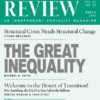A Red Robin?
In his estimable Robin Hood: People’s Outlaw and Forest Hero, it is Paul Buhle’s contention that in the almost eight centuries of his legendary existence, Robin has had his time come periodically but seldom more than now. With barbarians, foreign and domestic, at the gates whenever they are not in the palaces, the need for heroes to rise from the ranks of the masses is at least as urgent as it was in Robin Hood’s day.… Buhle argues that the world needs Robin Hood now more than ever. “We need Robin because rebellion against deteriorating conditions is inevitable….” | more…

April 2012 (Volume 63, Number 11)
For decades we have been arguing in Monthly Review that stagnation is the normal state of the mature monopoly-capitalist economies. Today the reality of stagnation is increasingly gaining the attention of the corporate media itself.… For those accustomed to thinking of the capitalist economy as either growing rapidly or occasionally falling into a severe crisis (from which it quickly bounces back), long-run stagnation is a difficult to understand phenomenon. [A stagnating economy] neither collapses into a full (or “classic”) crisis, which would allow it to clear out (or devalue) its overaccumulated capital, nor is it able to achieve a full recovery. Instead, it remains caught in a stagnation trap, limping along at a low rate of growth, with high unemployment and excess capacity. Under the circumstances—and without the help of some external stimulus like a major war, a financial bubble, or an epoch-making innovation—the capital accumulation process is unable to move off dead center. | more…
The Bull Market
The United States is in the midst of its quadrennial presidential election, a process that now extends so long as to be all but permanent. The campaign is also drenched in more money given by a small handful of billionaires than has been the case in the past. Since the 1970s the amount spent on political campaigns has increased dramatically in almost every election cycle. It has led to the formation of what we term the “money-and-media election complex,” which has a revenue base in the many billions of campaign dollars donated annually, and has effectively become the foundation of electoral politics in the United States. Moreover, the rate of increase in campaign spending from 2008 to 2010, and especially from 2008 to 2012, is now at an all-time high. | more…
Sado-Monetarism
Economist Edwin Dickens has written a series of significant articles analyzing the minutes of the meetings, dating back to the 1950s, of the Open Market Committee of the Federal Reserve Board. (The Committee is the main policy-making body of the Board.) Dickens’s research shows convincingly that the Federal Reserve’s partisan behavior is designed to tilt the economy in the direction of the wealthy by making workers more compliant.… A recent study formalized Dickens’s work by attempting to distinguish whether the policy actions of the Federal Reserve were responses to inflation or to low unemployment. The study concluded that “a baseless fear of full employment,” rather than the prevention of inflation, was the guiding principal of the Federal Reserve. The conclusion of this study should come as little surprise to people familiar with the Federal Reserve’s obsession with the danger of high wages. | more…
Faux Internationalism and Really Existing Imperialism
If truth is the first casualty of war, military intervention in the name of humanitarian ideals should likewise be the subject of skepticism. Such an approach is called for as the discourse of the Responsibility to Protect civilian populations is becoming a doctrinal principle in the West’s foreign policy toolbox. The notion that these big powers have the right to intervene in other (weak) countries’ internal affairs threatens to transform the foundation, if not the praxis, of international law.… Simultaneously, the ideology of “humanitarian interventionism,” which stands almost uncontested, can be interpreted as legitimizing a hidden political agenda. It has the potential of blurring existing ideological and political differences between neoconservatives, liberal internationalists in the United States and Europe, and a large section of left-wing forces around the world. All these currents have found common grounds in vindicating NATO’s military violations of the principle of national sovereignty. | more…
Red State Irony
The last four or five decades have seen extraordinary economic and population growth in the southern states of the United States, continuing historic developments that started during the Second World War and were later stimulated by the end of legal racial segregation. One national effect of those changes has been a continual shift in the center of economic growth for the whole country to the southern and western states, away from the Northeast and the Midwest “rust belt.” The character of the exploitation of labor in the South has changed as investment patterns have displaced large populations from manufacturing and extractive employment.… This new “New South” has been widely celebrated, even as regional wage rates still trail other sections of the country (and while the South shares the national upward redistribution of wealth). What is different now from the pattern in the 1950s is that realizing a return on investment by the sweating-it-out of workers is nothing like the obvious low-cost option it was then. | more…
Fredric Jameson on the Reserve Army
In the opening pages of The Limits to Capital, published in 1984, David Harvey jokes that everyone who reads Marx’s Capital seems bound to write a book about it. In 2012, we might well ask: Just one? Last year, many of the long-standing academic Marxists unleashed new introductory works, including Terry Eagleton, David Harvey, Eric Hobsbawm, and, unsurprisingly, Fredric Jameson. In Representing Capital, Jameson has written the best of the bunch: a surprising, energetic, and concise representation of the “totality” of capital. | more…

March 2012 (Volume 63, Number 10)
As we write this, in late January 2012, international representatives of the ruling class and its power elite—wealthy investors, corporate executives, politicians, state bureaucrats, economists, pundits, and sundry celebrities—are gathered at the World Economic Forum in Davos, Switzerland to discuss the state of the world. Today there is no disguising the fact that some five years since the Great Financial Crisis began, the United States, Europe, and Japan all remain caught in an economic slump that will not go away.… From MR‘s standpoint, the current stagnation is not at all unexpected but represents the normal tendency of global monopoly-finance capital, especially in the mature economies. This tendency was disguised in part during the last three decades or more by a series of financial bubbles (and before that by Cold War military spending). Now with financialization on the rocks capitalism is once again face-to-face with the specter of stagnation, with no visible way out. | more…
The Great Inequality
Growing inequality of income and wealth have characterized the U.S. economy for at least the past thirty years. Today, this inequality has become a central feature of politics, both mainstream and within such radical uprisings as the Occupy Wall Street phenomenon. This essay attempts to uncover the roots of inequality, showing that the source of it is in the nature of the capitalist economy. The magnitude of inequality ebbs and flows with the balance of class forces, but great inequality is built into the system’s fundamental structures. | more…
Structural Crisis Needs Structural Change
When stressing the need for a radical structural change it must be made clear right from the beginning that this is not a call for an unrealizable utopia. On the contrary, the primary defining characteristic of modern utopian theories was precisely the projection that their intended improvement in the conditions of the workers’ life could be achieved well within the existing structural framework of the criticized societies…. As we also know, the high-sounding “utilitarian” moral principle of “the greatest good for the greatest number” came to nothing since its Benthamite advocacy. The problem for us is that without a proper assessment of the nature of the economic and social crisis of our time—which by now cannot be denied by the defenders of the capitalist order even if they reject the need for a major change—the likelihood of success in this respect is negligible. | more…
Recessions and Human Misery
The National Bureau of Economic Research (NBER) decides the peak and trough dates of the business cycle. Most economists, including the government economists, accept their dates as the bible of research. Their dates do accomplish what they set out to do: they reflect the highest and lowest levels of business activity. This was the definition set by the founder of the NBER and it is very useful for many purposes. Certainly, there is a major gain if all economists use the same dates. Nevertheless, it is useful to ask a different question and use different dates for some purposes. Suppose we do not want to know the peaks and troughs of business activity, but instead we ask: How much human misery is caused by the cycle? There are many ways to answer that question, but the easiest is just to examine the duration of recessions in terms of human misery. | more…
Welcome to the Desert of Transition!
The world’s attention has been on the political transformations in the Middle East, the wave of protests from Tel Aviv to Madrid to Wall Street, and the ongoing Greek crisis. But in the shadow of this unrest, the post-socialist Balkans have been boiling. Protests displaying for the most part social demands broke out throughout 2011 in Romania, Albania, Serbia, Macedonia and, most notably, Croatia. Post-socialist citizens today feel largely excluded from the decision-making process. Most elections have turned out to be little more than a reshuffling of the same political oligarchy with no serious differences in political programs or rhetoric. During the privatization campaigns many lost their jobs, or had labor conditions worsen and pensions evaporate, and most of the guaranteed social benefits (such as free education and health care) have progressively disappeared as well. Neoliberal reforms were portrayed as a necessary part of the EU integration process. | more…
Reviving the Strike in the Shadow of PATCO
In the summer of 2011, labor unrest on both coasts provided a sharp rebuttal to the widely held view that the strike is dead (and buried) in the United States. Even as veterans of the Professional Air Traffic Controllers Organization (PATCO) gathered in Florida to commemorate the thirtieth anniversary of their historic defeat, a new generation of strikers was taking on big private-sector employers like Verizon and Kaiser Permanente. Last August, 45,000 Verizon workers walked out from Maine to Virginia in a high-profile struggle against contract concessions. One month later, they were joined by 20,000 nurses and other union members similarly opposed to pension and health care givebacks at Kaiser Permanente in California. Both of these struggles came right on the heels of last year’s biggest upsurge, the massive series of public employee demonstrations in Madison, Wisconsin that included strike activity by local high school teachers.… Like the walkouts of 2011, [the three books under review] remind us what striking looks like, whether it fails or succeeds in a single union bargaining unit, or becomes part of a broader protest movement. | more…